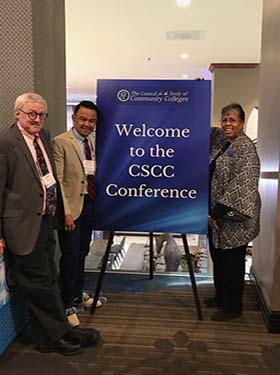As I participated in the Council for the Study of Community Colleges’ (CSCC) annual conference last week as a first-time attendee, the concept of “scholar practitioners” was a recurring theme that caught my attention. Prior to pursuing full-time doctoral work and becoming a Research Assistant at the Office of Community College Research and Leadership (OCCRL), I worked for nearly a decade in community college student services. My own experiences and transition from practitioner to researcher have caused me to reflect on the important role of each in supporting today’s community colleges. I embraced the terminology as I have always held that the two are not mutually exclusive and, in fact, pairing them together is imperative to the pursuit of access and equity in higher education.
As a community college practitioner, I found that the demands of the job and the limitations on resources could be barriers to the pursuit of scholarship. There is often too little time for, and too little access to, opportunities for scholarly research that can inform best practices unless practitioners embark upon further academic study. This journey is, no doubt, a daunting one not immune from structural inequalities that create additional barriers for many (but that is a blog post for another day). Prior to this conference, I had not heard the phrase “scholar practitioner” to describe those individuals who somehow manage to simultaneously participate in both worlds.
Throughout the CSCC conference, I found both scholarship and practice to be valued. From partnerships between researchers and scholar practitioners to the stated importance of current community college leaders informing curriculum development in community college leadership programs, the role of each in supporting the other appeared to be recognized and celebrated. I even found historical evidence of this value during a celebration of CSCC’s history honoring the Council’s first president, the late Raymond J. Young. I learned that this noted scholar had a role in the development of numerous community colleges in the nation, including my first destination as a young professional where I came to love community colleges and the students who attend them.
Moving from practitioner to researcher, I find such value in my previous experiences and in my network of former colleagues, many of them scholar practitioners themselves. I am fortunate to work and study under CSCC’s newest Senior Scholar Award recipient, Dr. Eboni Zamani-Gallaher, who has provided numerous opportunities for me to connect my practice to my scholarship and validated the importance of each. As noted by Floyd, Felsher, & Ramdin (2016), supporting collaboration between scholars and practitioners offers numerous benefits for future research on community colleges.
Reference
- Floyd, D. L., Felsher, R. A., & Ramdin, G. (2016). A retrospective of four decades of community college research. Community College Journal of Research and Practice, 40(1), 5-22.
